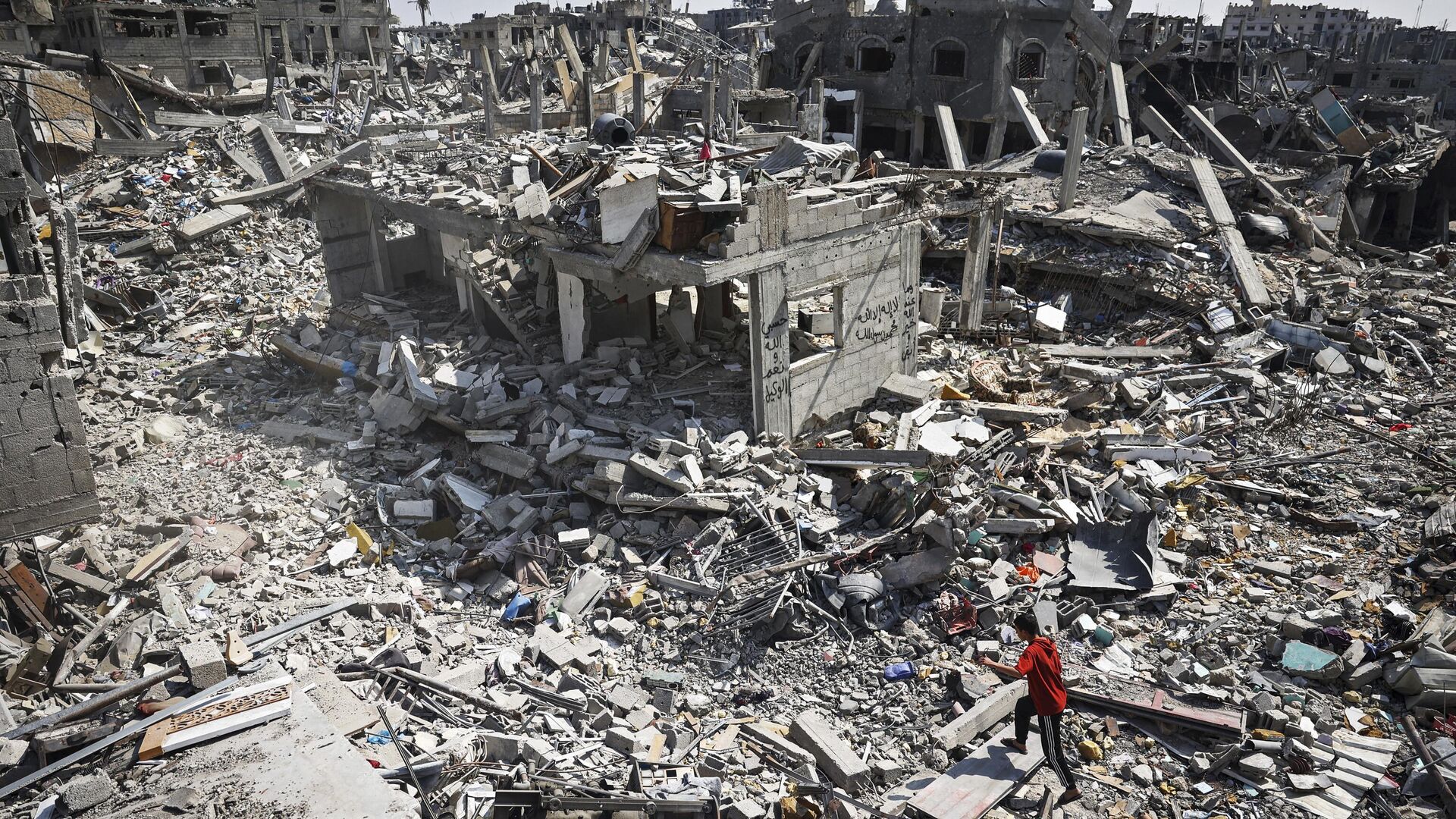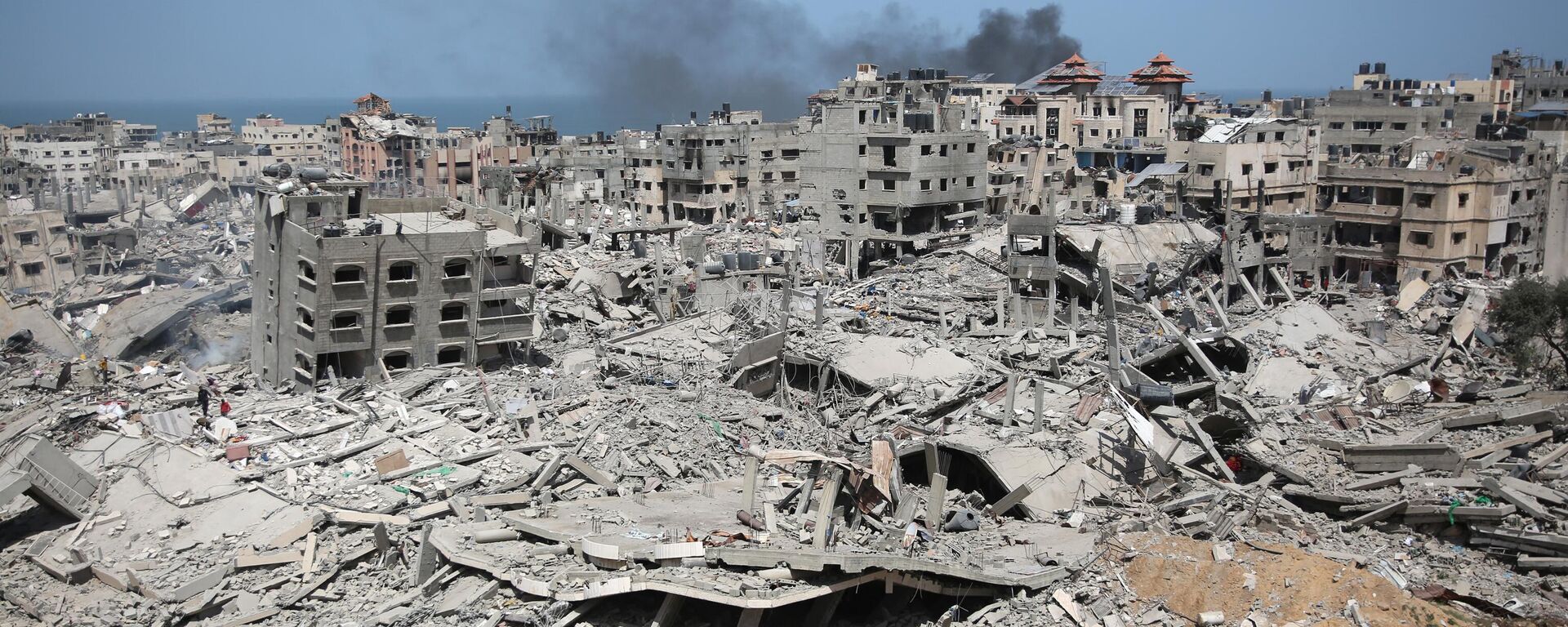https://sputnikglobe.com/20240417/new-york-times-gaza-war-memo-apologetic-to-israel--report-1117973188.html
New York Times Gaza War Memo 'Apologetic to Israel' – Report
New York Times Gaza War Memo 'Apologetic to Israel' – Report
Sputnik International
Right after the escalation of the Palestinian-Israeli conflict, some New York Times staffers began to spar over whether the newspaper sticks to principles of unbiased coverage of the developments.
2024-04-17T11:47+0000
2024-04-17T11:47+0000
2024-04-17T11:47+0000
israel
palestine-israel conflict
world
https://cdn1.img.sputnikglobe.com/img/07e8/04/11/1117972242_0:160:3072:1888_1920x0_80_0_0_9121af2ca41fe6ca647399b88f00ad46.jpg
New York Times (NYT) journalists covering Israel's war on Gaza were instructed to limit the use of the term "genocide" and avoid the phrase "occupied territory" when describing Palestinian land, according to a copy of the newspaper's memo obtained by The Intercept.The memo, which was written by NYT standards editor Susan Wessling, international editor Philip Pan, and their deputies, reportedly "offers guidance about some terms and other issues we [the newspaper] have grappled with since the start of the [Palestinian-Israeli] conflict in October [2023]."Additionally, the guidance instructs journalists to refrain from using the word "fighters" when mentioning the October 7 2023 attack on the Jewish state conducted by members of the Palestinian militant group Hamas, which led to the escalation of the Palestine-Israel conflict.In this vein, The Intercept quoted unnamed NYT newsroom sources as saying that while the memo is presented as an outline for maintaining objective journalistic principles in reporting on the Gaza war, some of the document's contents show evidence of the paper's adherence to Israeli narratives.As for the memo's admonition against using the term "occupied territories," it obscures the reality of the Palestinian-Israeli conflict and feeds Washington and Tel Aviv's claims that the conflict began on October 7, the insider said.The United Nations, along with much of the international community, considers the Gaza Strip, West Bank and East Jerusalem to be occupied Palestinian territory captured by Israel in the 1967 Arab-Israeli war.Separately, the memo urged the journalists "to think hard" before using the words like "slaughter," "massacre" and "carnage," which "often convey more emotion than information."This comes after The Intercept published the results of its analysis of the coverage of the Gaza war by the New York Times, the Washington Post, and the Los Angeles Times erage of between October 7 and November 24. On October 7, 2023, Hamas launched a large-scale rocket attack against the Jewish state, prompting Israeli Prime Minister Benjamin Netanyahu to declare a full-scale war against the Palestinian militant group. Israel then began the ongoing retaliatory strikes, ordered a complete blockade of Gaza, and launched a ground invasion of the Palestinian territory with the stated goal of eliminating Hamas militants and rescuing hostages taken by Hamas during the October 7 attack. Over 33,700 people have reportedly died due to Israeli strikes in Gaza so far, according to local officials. Israel's state's death toll currently stands at about 1,400.
https://sputnikglobe.com/20240407/even-with-ai-kill-list-israel-no-closer-to-achieving-goals-six-months-into-gaza-war-1117800746.html
israel
Sputnik International
feedback@sputniknews.com
+74956456601
MIA „Rosiya Segodnya“
2024
Oleg Burunov
https://cdn1.img.sputnikglobe.com/img/07e4/09/0b/1080424846_0:0:2048:2048_100x100_80_0_0_3d7b461f8a98586fa3fe739930816aea.jpg
Oleg Burunov
https://cdn1.img.sputnikglobe.com/img/07e4/09/0b/1080424846_0:0:2048:2048_100x100_80_0_0_3d7b461f8a98586fa3fe739930816aea.jpg
News
en_EN
Sputnik International
feedback@sputniknews.com
+74956456601
MIA „Rosiya Segodnya“
Sputnik International
feedback@sputniknews.com
+74956456601
MIA „Rosiya Segodnya“
Oleg Burunov
https://cdn1.img.sputnikglobe.com/img/07e4/09/0b/1080424846_0:0:2048:2048_100x100_80_0_0_3d7b461f8a98586fa3fe739930816aea.jpg
escalation of the palestinian-israeli conflict, new york times (nyt) journalists, israel’s war on the gaza strip, american coverage of israel, nyt's palestine memo, why is nyt pro-israel, why does us support israel
escalation of the palestinian-israeli conflict, new york times (nyt) journalists, israel’s war on the gaza strip, american coverage of israel, nyt's palestine memo, why is nyt pro-israel, why does us support israel
New York Times Gaza War Memo 'Apologetic to Israel' – Report
Immediately following the escalation of the Palestinian-Israeli conflict as a result of last year's Hamas attack, some New York Times staffers began to argue about whether the paper was adhering to the principles of unbiased coverage of developments.
New York Times (NYT) journalists covering Israel's war on
Gaza were instructed to limit the use of the term "genocide" and avoid the phrase "occupied territory" when describing Palestinian land, according to a copy of the newspaper's memo obtained by The Intercept.
The memo, which was written by NYT standards editor Susan Wessling, international editor Philip Pan, and their deputies, reportedly "offers guidance about some terms and other issues we [the newspaper] have grappled with since the start of
the [Palestinian-Israeli] conflict in October [2023]."
The authors of the memo also warned NYT reporters against using the word Palestine "except in very rare cases" and the term "refugee camps," which were recognized by the UN and accommodate hundreds of thousands of registered Palestinian refugees.
Additionally, the guidance instructs journalists to refrain from using the word "fighters" when mentioning
the October 7 2023 attack on the Jewish state conducted by members of the Palestinian militant group Hamas, which led to the escalation of the Palestine-Israel conflict.
In this vein, The Intercept quoted unnamed NYT newsroom sources as saying that while the memo is presented as an outline for maintaining objective journalistic principles in reporting on the Gaza war, some of the document's contents show evidence of the paper's adherence to Israeli narratives.
"I think it’s the kind of thing that looks professional and logical if you have no knowledge of the historical context of the Palestinian-Israeli conflict. But if you do know, it will be clear how apologetic it is to Israel," one of the sources pointed out.
As for the memo's admonition against using the term "occupied territories," it obscures the reality of the Palestinian-Israeli conflict and feeds Washington and Tel Aviv's claims that the conflict began on October 7, the insider said.
"You are basically taking the occupation out of the coverage, which is the actual core of the conflict. It’s like, ‘Oh let’s not say occupation because it might make it look like we’re justifying a terrorist attack,'" the source stressed.
The United Nations, along with much of the international community, considers the Gaza Strip, West Bank and East Jerusalem to be occupied Palestinian territory captured by Israel in the 1967 Arab-Israeli war.
Separately, the memo urged the journalists "to think hard" before using the words like "slaughter," "massacre" and "carnage," which "often convey more emotion than information."
"Can we articulate why we are applying those words to one particular situation and not another? As always, we should focus on clarity and precision — describe what happened rather than using a label," the guide pointed out.
This comes after The Intercept published the results of its analysis of the coverage of the Gaza war by the New York Times, the Washington Post, and the Los Angeles Times erage of between October 7 and November 24.
The analysis found that the NYT had described Israeli deaths as a "massacre" on 53 occasions and the deaths of Palestinians just once. The ratio for the use of "slaughter" by the NYT was 22 to 1, even as the documented number of Palestinians killed climbed to around 15,000 in late November.
On October 7, 2023, Hamas launched a large-scale rocket attack against the Jewish state, prompting Israeli Prime Minister Benjamin Netanyahu to declare a full-scale war against the Palestinian militant group. Israel then began the ongoing retaliatory strikes, ordered a complete blockade of Gaza, and launched a ground invasion of the Palestinian territory with the stated goal of eliminating Hamas militants and rescuing hostages taken by Hamas during the October 7 attack. Over 33,700 people have reportedly died due to Israeli strikes in Gaza so far, according to local officials. Israel's state's death toll currently stands at about 1,400.






